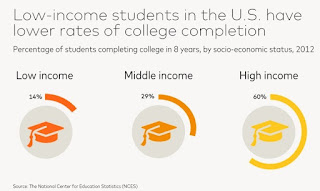Blog #4
Richa Patel Professor Goeller Research in Disciplines: College February 26, 2021 Working title: College completion gap between high and low-income students Topic The topic that has been chosen for this proposal is to assess the contribution of financial aids on the academic establishment of the students from low-income groups. This is a very significant topic among the educational sector since low-income students lack the affordability towards availing the courses. They can attend part-time courses, which is not a permanent solution, as they drop these courses for their financial conditions. This situation has to be changed at any cost because this gap will determine the rates of unemployment in the country ( Bjorklund-Young: 24). This gap has to be reduced to promote income equality and better employability among youth throughout all communities whether their income is high or low. Proper investigations are needed in terms of a...
